- Home
- S. E. Smith
An Unkindness of Ravens Page 2
An Unkindness of Ravens Read online
Page 2
I suppose I could have told His Majesty about Emily. Yet something, possibly his sad blue eyes, held me back. More of a stickler for class than his mother, he could tolerate my affair with a widow - even if she possessed a boorish baronet for a brother-in-law. However, given Bertie’s views on his late son’s forays with lightskirts and their ilk, he would not countenance any kind of association with a girl of working-class stock.
Of course, while Bertie knew of the cufflink case and its implications; there was never any mention of the young lady so central to its solving. It was as though my future monarch – advised by the prime minister – decided there were things he didn’t need to know.
Pulling myself out of the past I listened to my cousin’s somewhat tedious explanation as to why a long dead royal physician brought him to my door. I let him ramble, half listening, half speculating until ...
Taking his handkerchief out of his pocket - a well-known sign that matters conclusion, CC said: “Well, of course, Gull’s replacement as Physician Ordinaire declared himself above such things. Left it to the palace staff to pack his office for him rather than oversee the job himself.”
“Let me guess, in the middle of the move, they found something?” I hazarded, hoping I asked the right question.
CC nodded before blowing his nose. “Yes. One of Gull’s journals. Relates to the Bravo case.”
Long dormant scorpions awoke and, joining with those already assembled, dulled my normally spectacular power of recall. “Who?”
“A solicitor with a house on the edge of Tooting Common.”
I nudged the scorpions to one side, ignoring their warning of foolishness, and concentrated on the reality of my cousin’s words. “Murdered ...”
He smiled, grimly. “Possibly. They never found the killer.”
“How’d he die?”
CC waved his handkerchief. “Antimony.”
“Oh yes, I remember reading about it ...”
“Thought you would.” CC appeared satisfied by my response and sat back; leaving me to metaphorically scoop up the last of the escaped scorpions who felt it its duty to tell me about Charles Bravo as I did so.
From Reports.
The Priory, Bedford Hill, Tooting,1876.
Three days of agony - a slow, lingering, appalling death. The doctors tried their best to save him, but there was nothing they could do. Slowly the poison boiled away his stomach. Destroying his gut inch by agonising inch.
“How’d it get in your system?”
Initially Bravo refused to say anything other than he took laudanum, and nothing else. In the last hours, either out of stubborn refusal or genuine ignorance, he didn’t say anything at all. Not even when Death’s bony fingers tightened their grip.
His wife – cheeks remarkably free of tears – kept a bedside vigil.
His servants huddled in corridors - their conversations stifled and cautious.
Clearly puzzled, Doctor Johnson tutted and spoke to his colleagues in hushed tones before taking a vial of vomit away for analysis.
The police had no need for such reverence. Time was of the essence - a man lay dying.
By the end of the first day, they reached their conclusions.
The chief inspector in charge of the case held firm to the theory Bravo drank the poison willingly.
Sergeant Parker maintained the companion had motive and opportunity - as did the wife. He suggested they were in it together.
Newly promoted Sergeant Lamb – on secondment from City Police – questioned the Balham chemists but got nowhere. Antimony was readily available, and it was easy to lie on the poison register.
Angered by their general lack of progress, the chief inspector told Lamb to find out more about the sacked gardener. Lamb accepted this change of direction with pleasure; probably because he met a nice young lady doing so.
From the Casebook of Symington, Earl Byrd.1901.
I put down the book I allegedly perused whilst recalling the details of Bravo’s heinous death. “So, what do Gull’s papers say, CC? Who does he name as the killer of Charles Bravo?”
“He doesn’t. Ramblings really. Police incompetence; corruption in high places. The usual kind of nonsense ... Salisbury wants you to cast your eye over them. Tell him what you think. They cover the period from ‘75 to his death in ‘90. You’re to go over them cover to cover.”
I groaned. “He could have sent a flunky. Or did Salisbury surmise I’d take the order better from you?”
“Neither. I’m here for a different reason than the ramblings of a deluded man, except ...” My cousin fell into a strange silence, and his face creased into a series of lines. “Violent deaths don’t go unpunished!”
“This one did.”
CC’s lines grew deeper. “Gull’s diary’s not just about Bravo. Or his death.”
I sat up interested. “It’s not, cousin dearest? Pray tell, what the bally hell did he write about?”
CC glared, blew his nose, and handed over a black leather-bound volume. “I marked the page.”
I found the bookmark easily enough and turned to it. Gull’s writing was cramped, crossed over itself in places in a hand indicative of agitation ... or illness.
“This is nonsense!” I said once I finished reading the prescribed pages.
CC blew his nose again and glared. “I already told you that.”
“No. I don’t mean like that ... this is deliberate nonsense.” I opened the diary to its widest and inspected the spine. “Sampson, my Gladstone.”
After retrieving my bag, my valet took stock of the situation and went to the sideboard. Whilst he poured drinks, I availed myself of my bottle-top spectacles. Putting them on right arm first, I examined the spine and cover carefully.
“Gull’s altered his diary,” I said a few minutes later when, having put my glasses away, I blinked owlishly.
“Surely not, Major?”
I ignored Sampson’s sarcasm. “The nonsense verse and the torn out pages indicate turbulence. Possibly a frightened mind. Possibly a mind that wants justice done. Not once, not twice, but thrice. We must work out what he wanted us to know- and voila, as they say!” I flourished an arm in my classic roman emperor manner and smiled. “Behold, cousin of mine, valet of mine, I’ll bet you a wet weekend in Margate with a willing woman – all expenses paid – we’ll soon understand what frightened him so much.”
CC blinked. Sampson tutted in disapproval and read over his notes. To cover my delight at their discomfort, I looked back at the diary, then: “Sampson, stir yourself. Get me a copy of ‘Huntin’ of the Snark’!”
Sampson jumped to action and disappeared into the study, where I kept my most useful books.
“You could have gone yourself,” CC scolded. “He’s not a young man.”
“Indeed.” I waved my agreement. “But we’ve all been twiddling our thumbs since the Queen’s death. He’s bored cousin dearest. So very bored. He sits, metaphorically crying like the beaver.” I smiled at CC’s nod of understanding. “Besides, I’m a selfish brute and would only have brought back my own tome. The worthy sergeant has a copy, as does Watkins. Trust me three snarks and a bandersnatch will return through my door. And we need the mind of the bandersnatch.”
CC’s understanding transformed itself into one of quizzical interest. “We do? Why?”
I waved imperiously. “Peace, I prithee. Peace.”
Time proved me master of my domain. Three books, and a Sampson ready for battle, returned to the lounge after a short absence.
CC’s lips twitched at the martial light in my batman’s eyes but he managed a curt and solemn thank you on receiving his copy. “What are we looking for?” he asked frantically flipping pages back and forth.
I waved regally; he fell silent. “Pick a page. Any page. Familiarise yourself with the style, the words; the form if you will.” When both men were done, I shut my own copy of The Hunting of the Snark and picked up Gull’s diary.
“They chased her with thimbles, they chas
ed her with ropes,
they roasted her, left her to die.
They threatened her life with back of their tongues;
they lashed her from pillar to post.
And when they had done and all far away,
all leaving our Bella in tears,
she threw off her life with a Bravonian cry
and ...”
“And what? Finish the line!”
I shook my head “I can’t, CC old thing. ‘Tis how it ends.”
My cousin blew his nose in disgust and fixing on one word elaborated upon it. “Appalling. An appalling rhyme, an appalling parody.” He ran out of things to say and stared at Sampson.
“Snark like,” my valet commented dryly. “I assume Gull’s talking about the death of a lass called Bella.”
“I think that’s a given,” I agreed. “Like the Bravonian cry must be a reference to antimony.” I looked at CC. “But as to who Bella is? Who they are? And what Gull’s role in all this is ...” I fell silent and we stared at each other, hopelessly trying to decipher Gull’s puzzle from beyond the grave.
“Those who made her life hell could be servants,” Sampson said eventually. “They can be a vicious breed.” I grinned agreement. “I called them ravens as a child newly arrived in Wales, remember CC?”
My cousin’s eyes were locked in another world. “Langley was a servant of sorts,” he muttered.
Sampson and I exchanged looks. “Who the devil is Langley?”
CC blinked and returned to us. “The lowliest of clerks in Bravo’s empire. Already working his notice when the murder occurred. Left the country soon after.” His voice dripped with the sarcasm of those convinced they had the whole conversation out loud.
“Pray tell, what does he have to do with Gull’s ramblings?”
“Local water boy pulled his body out of the Thames, hence my reason for being here. That and his name’s in Gull’s diary. A cook vanished too. A woman named Poulter; worked next door. A bit of work by all accounts. Liked the drink. Supposed to have smothered a baby ... nothing proven ... Langley wrote her a letter. Wanted her to visit him.”
I asked again who Langley was, but if I wanted clarity, CC did not deliver, saying only: “Luckily Lamb recognised him.”
Lamb was CC’s long-suffering sergeant. Well past retirement, this white-haired foil held on to his few black hairs with the same tenacity he used to pursue a criminal to justice. Lamb knew something about everything in London. A first-rate man to have in your corner, a mine of information. One I regularly tapped.
“He did? Excellent.” Sarcasm washed over CC like the rivers of Babylon, forcing me to add, “But all men die. All women too.”
CC drew himself to his full height, sloshing scotch around his glass as he emphasised his point: “Usually, Symington, they don’t blow their own stomachs away and throw themselves into the Thames afterwards.”
Southwark Mortuary, Tuesday 26th February.
Down a little side street, not far from the tube station and Brunel’s Engine Room, stood a mortuary with a high glass roof. A beautiful building merging functionality with aesthetics. I’ve been there many times since, but that morning, when I saw the place for the first time, I fell in love. It was a place of excitement. A place of magic. A place where science met possibilities.
The designers of Southwark mortuary were far-sighted people. Marble floors and all mod cons – including winches to open the ceiling windows – and yet, they held on to the belief that strangers were diseased. Thus, there were two rooms - for locals and aliens. Robert Langley – having been found floating in said river– reposed in the latter. Hanging like an animal carcass from the ceiling. Drip-drying, until enough water left the body to make autopsy possible.
One look at him told me much of the physical evidence from the corpse was lost to the tides and fishes. Yet I persisted with my investigation. Staring intently through my bottle-tops; hoping to find something to help me with this case.
Failing miserably, for of late luck conspired against me, I moved over to a table where some thoughtful soul had placed Langley’s limited personal effects. Again, little to go on.
“Shoes?”
Lamb shook his head. I continued my perusal.
“Found that hidden in a pocket in the seat of his trousers,” he explained when he clocked the direction of my regard: a photograph of a house that looked like a castle. A touch too forbidding and a tad too ostentatious for its middle-class surroundings. “Being well wrapped in oilskins, it avoided the worst the Thames could do.” Lamb rubbed at his upper arm like it pained him. He did that when remembering those bits of his past he usually wished to forget.
Politeness became a real interest.
“Mind you, my lord, turns out I didn’t need that or the other one. Soon as I got here, I recognised him. Don’t forget your first case as sergeant ... or a nose like that.”
“Yes, CC said ... Someone’s thought to put the address as well as the names on this one.” I turned the photograph again. “A wonderfully clear picture, but the composition’s wrong.” I stared again, unable to work out what made me reach the conclusion I did. “Should’ve brought Sampson with me, he’d tell us!”
It was a good job I talked to myself, for all the interest Lamb paid. He remained unusually preoccupied, though fortunately the reason soon became clear. He couldn’t take his eyes off the dead man. I joined CC’s sergeant at the hook.
“Wonder where he’s been all these years?” Lamb pointed to the dead man’s be-whiskered visage. “Even after the Thames has done her work, it’s noticeable, and you don’t normally get a tan like that in Great Britain.”
“My guess is somewhere warm, sunny - hopefully with a plentiful supply of rum.”
“No passport, nor a wallet.”
Lamb and I exchanged looks.
“Someone didn’t want him identified.” I smiled grimly, “Wonder why? Wonder who? They didn’t do a thorough job of destroying his identity if they didn’t find these photographs. Disturbed possibly?”
“I’ll put the boys on it. Young Constable Barker’s got a mate who’s a genius at trajectories, and angles, and things. Soon work out where the poor sod went in the water. Once we confirm where, we’ll have an idea whether ...” Lamb also talked to himself. His utterances were now low unintelligible mutterings. Half Queen’s English, half cockney, half something else entirely.
I pulled myself up at the absurd mathematical incongruence of that final statement and changed the subject. “Who’s the police surgeon?”
“Smith.”
“Oh.” Deflated, I stared at the body and counted to ten. “Called murder just by looking. Does he intend to dig further?”
Lamb didn’t need to answer. We both knew Smith. A competent man - for his era ...
“I’ll tell Smith that Doctor McGregor will be here to view the body in the next few days, shall I?” Lamb asked. “Would say he’ll be as dry as he’s going to be by the weekend ...”
I waved regally. “Thank you, Lamb, my man. You’re a treasure.” I smiled before continuing, “Will you tell me if you find anything? Like where this poor dead soul resided before the river claimed him?”
I turned towards the door, but something nagged at the corners of my memory, and I wandered back to the table to take one last look at the four people contained in the photo. “Lamb?”
“My lord?”
“You said you didn’t need the photograph to identify him?”
“Aye.”
“What about the other people in the photo? Who are they?”
Lamb scrubbed viciously at his arm. “Their faces are familiar, but I’m sorry to say I can’t remember their names.” He appeared sorrowful. “Time’s doing awful things to my memory.”
“Time does that old chap. Makes mutton of all us lambs.” Lamb grinned at my terrible joke and, having rescued him from the elephant of memory, I continued. “Be a dear. See if you can remember them. Langley took care to hide these photographs, it must
be because they held importance.”
“Very well, my lord. Will you visit Scotland Yard? Or d’you want me in Mayfair?”
I waved regally. “The Yard will be super. I’m that way later this afternoon.”
And, after checking I wouldn’t be late for my Piccadilly lunch date with Lord Cardew, I grabbed the last of my bits and headed to the city.
At well over seventy, Cardew was the biggest gossip in London - if not England. Still, his parliamentary knowledge of the last forty years was phenomenal, and only a fool refused to ignore him as a source of information. Even if he made decent men shiver.
The old boy was already on his third glass of claret by the time I arrived. One of the stewards, a steady chap by the name of Grant, took me aside. He told me Cardew imbibed steadily, but fortunately held his own.
Forewarned is forearmed as they say, but I needed to be quick. Cardew had already called for the fourth glass. “In that case, Grant, I feel coffee is the order of the day.”
The steward bowed. “Would you like me to announce you?”
I shook my head and, as Grant departed on his quest, I made my way over to my quarry.
Ensconced in a green leather armchair, Cardew did a phenomenal impression of a sober man. But there was a redness to the nose and cheeks that showed too much fine living, and a slight slur to his words that indicated indiscretion and loudness were to be his watchwords.
“You don’t have your filly with you? Shame. She was pleasing to the eyes. Did you tire of roughing it?” Cardew laughed while I fought the desire to remind him of said filly’s antecedents.
I sank into the chair to his left, and we talked of this and that until I saw Grant enter the room with more coffee than requested. Clearly the steward knew more about Cardew’s inebriated state than he let on.
I poured two cups and stirred lashings of cream and sugar into one, before doing much the same with the second. Cardew eyed my actions with distaste, even going so far as to wince when I handed him a cup, but I noticed the old boy drank it nonetheless.

 The Sea King's Lady
The Sea King's Lady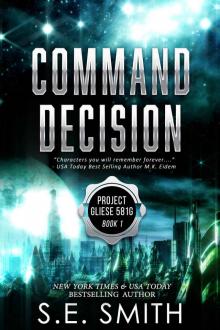 Command Decision
Command Decision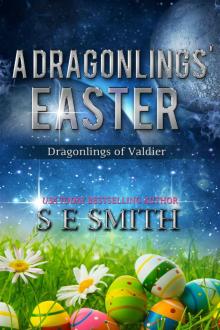 A Dragonlings' Easter
A Dragonlings' Easter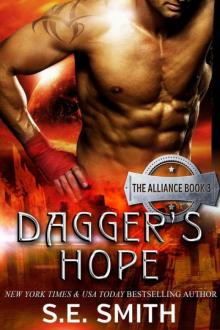 Dagger's Hope
Dagger's Hope Embrace the Romance
Embrace the Romance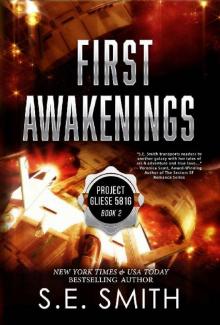 First Awakenings
First Awakenings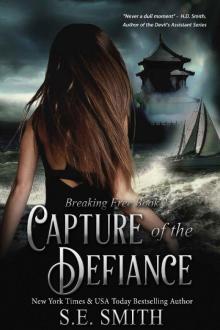 Capture of the Defiance
Capture of the Defiance Indiana Wild
Indiana Wild 02 Dragon - Capturing Cara
02 Dragon - Capturing Cara The Sea King's Lady_A Seven Kingdoms Tale 2
The Sea King's Lady_A Seven Kingdoms Tale 2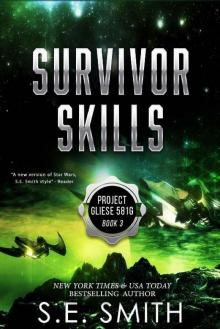 Survivor Skills
Survivor Skills Tink's Neverland
Tink's Neverland Voyage of the Defiance
Voyage of the Defiance Merrick's Maiden
Merrick's Maiden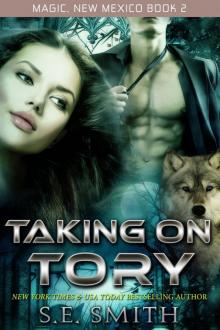 Taking on Tory
Taking on Tory Twin Dragon’s Destiny
Twin Dragon’s Destiny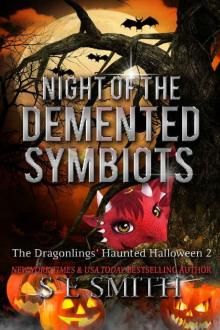 Night of the Demented Symbiots
Night of the Demented Symbiots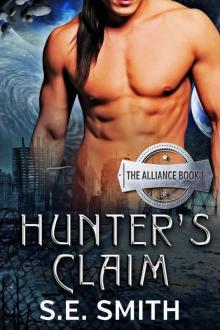 Hunter's Claim
Hunter's Claim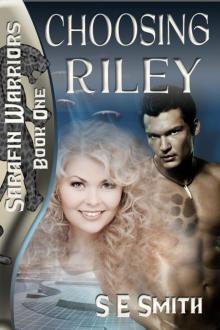 Choosing Riley
Choosing Riley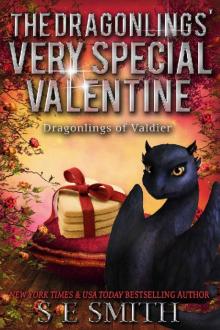 The Dragonlings’ Very Special Valentine
The Dragonlings’ Very Special Valentine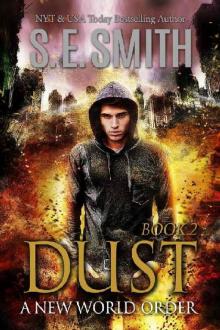 Dust 2_A New World Order
Dust 2_A New World Order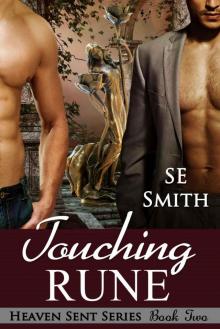 Touching Rune
Touching Rune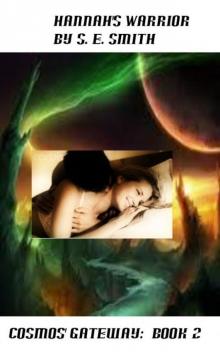 Hannah's Warrior
Hannah's Warrior Edge of Insanity
Edge of Insanity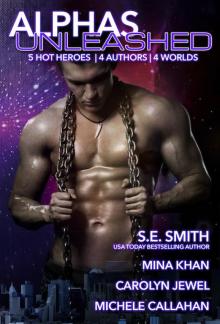 Alphas Unleashed
Alphas Unleashed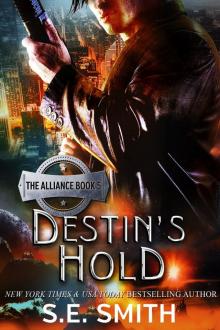 Destin's Hold
Destin's Hold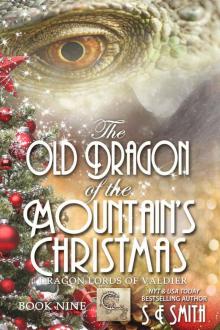 The Old Dragon of the Mountain's Christmas
The Old Dragon of the Mountain's Christmas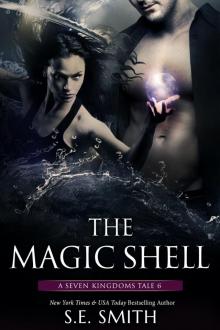 The Magic Shell
The Magic Shell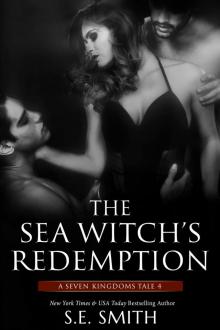 The Sea Witch's Redemption
The Sea Witch's Redemption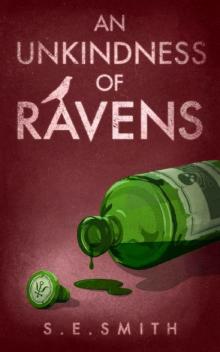 An Unkindness of Ravens
An Unkindness of Ravens Capturing Cara
Capturing Cara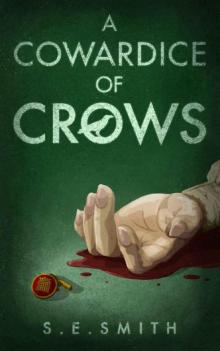 A Cowardice of Crows
A Cowardice of Crows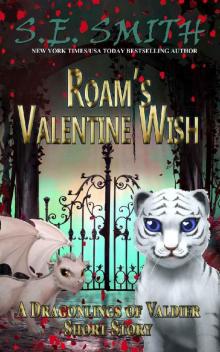 Roam's Valentine Wish
Roam's Valentine Wish The Dark Prince's Prize (Curizan Warrior Book 2)
The Dark Prince's Prize (Curizan Warrior Book 2)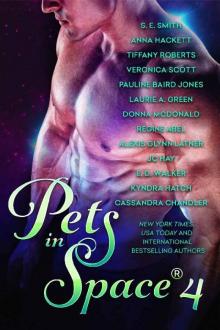 Pets in Space® 4
Pets in Space® 4 Ha'ven's Song
Ha'ven's Song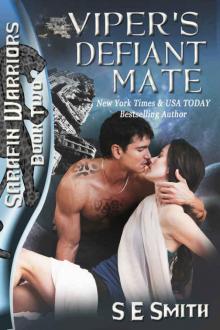 Viper's Defiant Mate
Viper's Defiant Mate Cosmos' Promise
Cosmos' Promise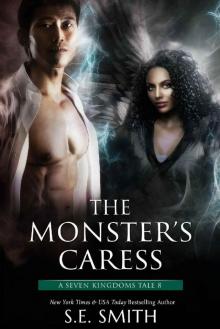 The Monster's Caress: A Seven Kingdoms Tale 8 (The Seven Kingdoms)
The Monster's Caress: A Seven Kingdoms Tale 8 (The Seven Kingdoms) Heart of the Cat
Heart of the Cat Alexandru's Kiss
Alexandru's Kiss Gracie's Touch
Gracie's Touch Saving Runt
Saving Runt Jo's Journey
Jo's Journey Tilly Gets Her Man
Tilly Gets Her Man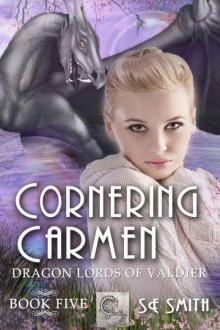 Cornering Carmen
Cornering Carmen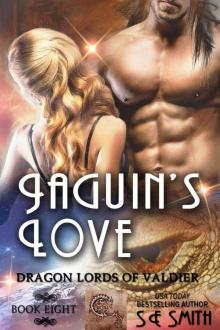 Jaguin's Love
Jaguin's Love For the Love of Tia
For the Love of Tia Twin Dragons
Twin Dragons Risteard’s Unwilling Empress
Risteard’s Unwilling Empress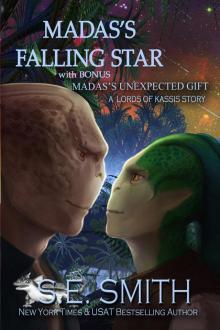 Madas's Falling Star featuring Madas's Unexpected Gift
Madas's Falling Star featuring Madas's Unexpected Gift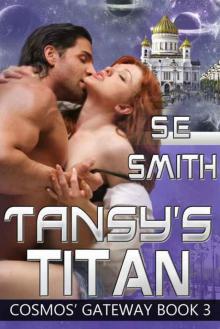 Tansy's Titan
Tansy's Titan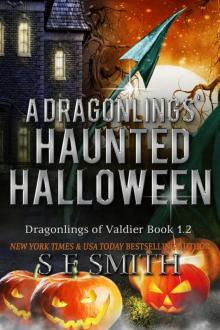 A Dragonlings' Haunted Halloween
A Dragonlings' Haunted Halloween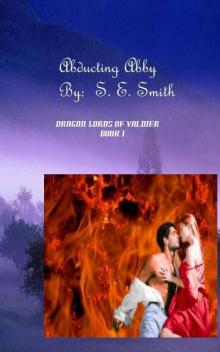 Abducting Abby
Abducting Abby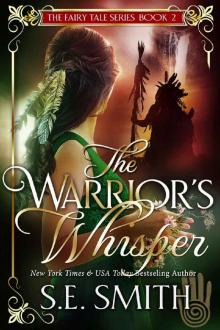 The Warrior’s Whisper (The Fairy Tale Series Book 2)
The Warrior’s Whisper (The Fairy Tale Series Book 2) A Dragonlings' Magical Christmas
A Dragonlings' Magical Christmas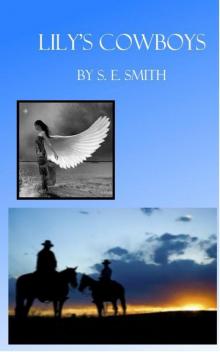 Lily's Cowboys
Lily's Cowboys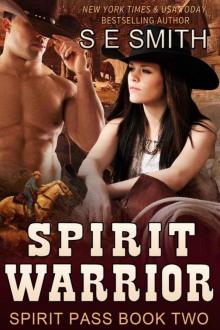 Spirit Warrior
Spirit Warrior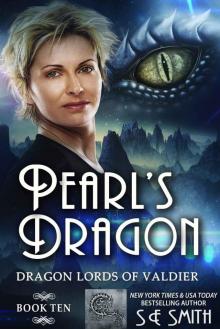 Pearl's Dragon
Pearl's Dragon Krac's Firebrand
Krac's Firebrand The Dragon's Treasure
The Dragon's Treasure The Magic Shell: A Seven Kingdoms Tale 6 (The Seven Kingdoms)
The Magic Shell: A Seven Kingdoms Tale 6 (The Seven Kingdoms) Core's Attack
Core's Attack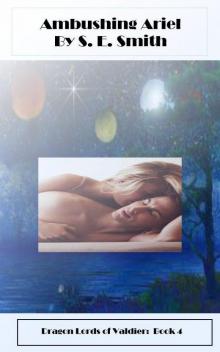 Ambushing Ariel
Ambushing Ariel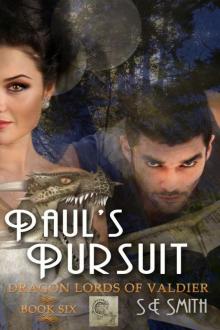 Paul's Pursuit: Dragon Lords of Valdier Book 6
Paul's Pursuit: Dragon Lords of Valdier Book 6 Star's Storm
Star's Storm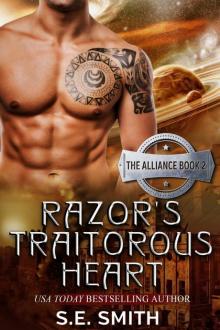 Razor's Traitorous Heart
Razor's Traitorous Heart The Alliance Boxset 2
The Alliance Boxset 2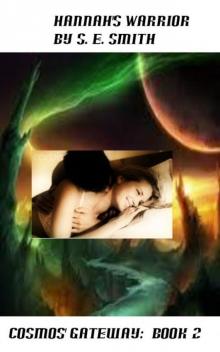 Hannah's Warrior: Cosmos' Gateway Book 2
Hannah's Warrior: Cosmos' Gateway Book 2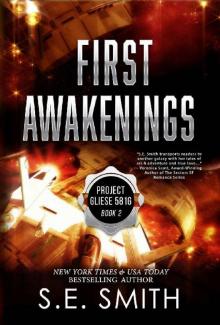 First Awakenings: Science Fiction Romance (Project Gliese 581g Book 2)
First Awakenings: Science Fiction Romance (Project Gliese 581g Book 2)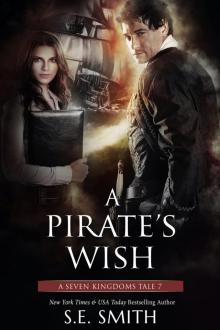 A Pirate's Wish
A Pirate's Wish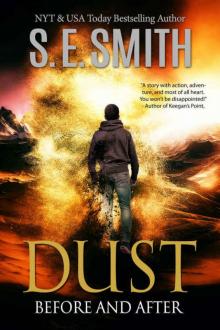 Dust: Before and After
Dust: Before and After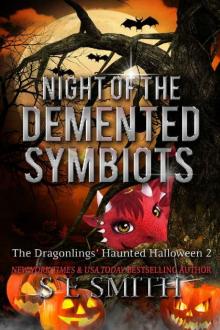 The Dragonlings' Haunted Halloween 2: Night of the Demented Symbiots (Dragonlings of Valdier)
The Dragonlings' Haunted Halloween 2: Night of the Demented Symbiots (Dragonlings of Valdier) Pets in Space: Cats, Dogs, and Other Worldly Creatures
Pets in Space: Cats, Dogs, and Other Worldly Creatures Capturing Cara (Dragon Lords of Valdier Book 2)
Capturing Cara (Dragon Lords of Valdier Book 2) The Beast Prince (The Fairy Tale Series Book 1)
The Beast Prince (The Fairy Tale Series Book 1) Twin Dragons: Dragon Lords of Valdier Book 7
Twin Dragons: Dragon Lords of Valdier Book 7 Cosmos' Promise: Cosmos' Gateway Book 4
Cosmos' Promise: Cosmos' Gateway Book 4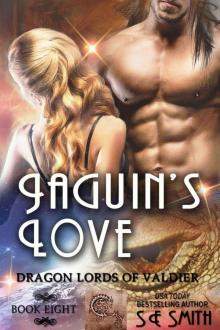 Jaguin's Love: Dragon Lords of Valdier Book 8
Jaguin's Love: Dragon Lords of Valdier Book 8 For the Love of Tia: Dragon Lords of Valdier Book 4.1
For the Love of Tia: Dragon Lords of Valdier Book 4.1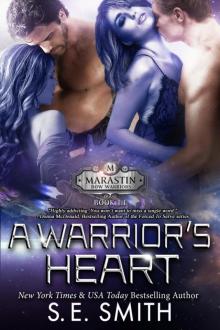 A Warrior's Heart
A Warrior's Heart Indiana Wild (Spirit Pass Book 1)
Indiana Wild (Spirit Pass Book 1) The Sea King's Lady: A Seven Kingdoms Tale 2 (The Seven Kingdoms)
The Sea King's Lady: A Seven Kingdoms Tale 2 (The Seven Kingdoms) The Dragon’s Treasure: A Seven Kingdoms Tale 1
The Dragon’s Treasure: A Seven Kingdoms Tale 1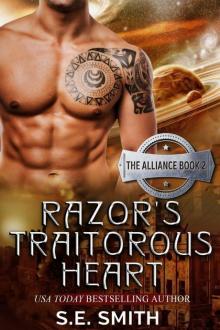 Razor's Traitorous Heart: The Alliance Book 2
Razor's Traitorous Heart: The Alliance Book 2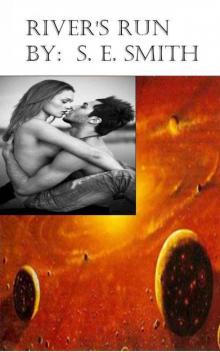 River's Run (Lords of Kassis: Book 1)
River's Run (Lords of Kassis: Book 1)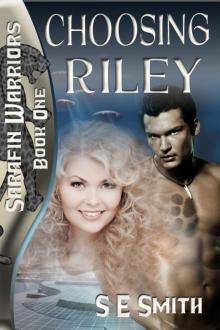 Choosing Riley: Sarafin Warriors Book 1
Choosing Riley: Sarafin Warriors Book 1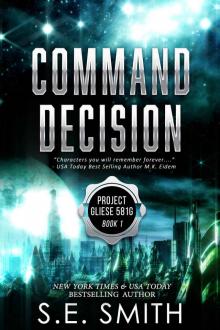 Command Decision: Project Gliese 581g
Command Decision: Project Gliese 581g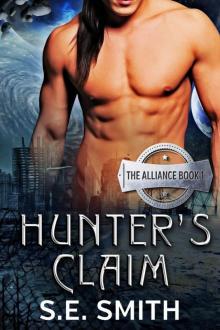 Hunter's Claim: The Alliance Book 1
Hunter's Claim: The Alliance Book 1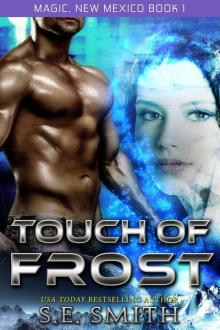 A Touch of Frost
A Touch of Frost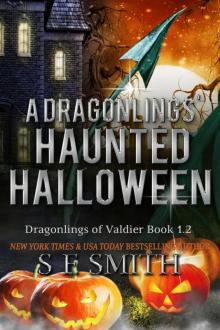 A Dragonlings' Haunted Halloween: Dragonlings of Valdier
A Dragonlings' Haunted Halloween: Dragonlings of Valdier Gracie's Touch Zion Warriors 1
Gracie's Touch Zion Warriors 1 Ristèard Unwilling Empress
Ristèard Unwilling Empress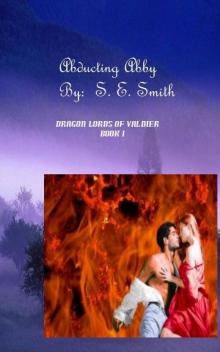 Abducting Abby (Dragon Lords of Valdier: Book 1)
Abducting Abby (Dragon Lords of Valdier: Book 1)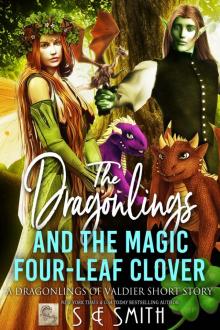 The Dragonlings and the Magic Four-Leaf Clover
The Dragonlings and the Magic Four-Leaf Clover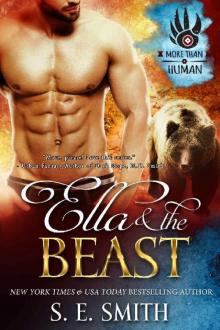 Ella and the Beast (More Than Human Book 1)
Ella and the Beast (More Than Human Book 1) Tink's Neverland (Cosmos' Gateway Book 1)
Tink's Neverland (Cosmos' Gateway Book 1)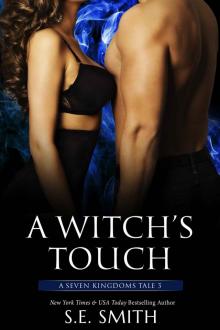 A Witch’s Touch
A Witch’s Touch A Dragonlings' Magical Christmas: Dragonlings of Valdier Book 1.3 (Dragonlings of Valider)
A Dragonlings' Magical Christmas: Dragonlings of Valdier Book 1.3 (Dragonlings of Valider)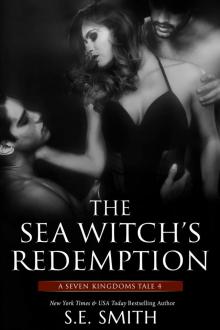 The Sea Witch’s Redemption: Seven Kingdoms Tale 4
The Sea Witch’s Redemption: Seven Kingdoms Tale 4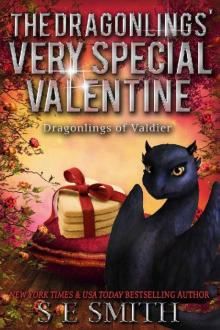 The Dragonlings’ Very Special Valentine: Science Fiction Romance (Dragonlings of Valdier Book 4)
The Dragonlings’ Very Special Valentine: Science Fiction Romance (Dragonlings of Valdier Book 4) Star's Storm: Lords of Kassis Book 2
Star's Storm: Lords of Kassis Book 2 Ristèard Unwilling Empress: Lords of Kassis Book 4
Ristèard Unwilling Empress: Lords of Kassis Book 4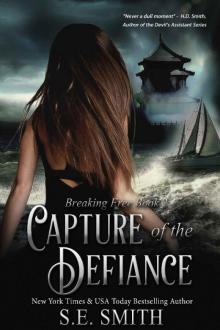 Capture of the Defiance: Romantic Suspense (Breaking Free Book 2)
Capture of the Defiance: Romantic Suspense (Breaking Free Book 2)